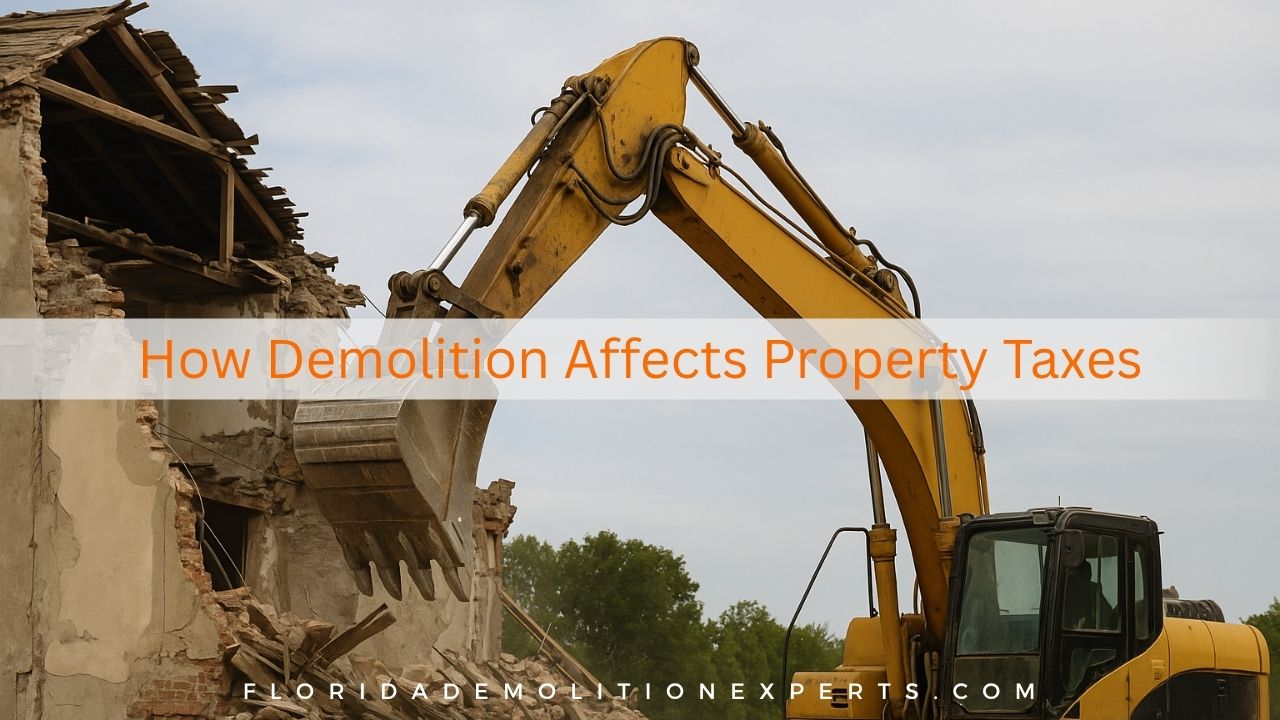Can demolishing your old building save you money or cost you more in Florida?
Florida’s property tax system and insurance laws have evolved significantly in recent years. New legislation, shifting insurance practices, and stricter building codes mean demolition is no longer a simple tear-down and move-on decision.
For homeowners, missteps in planning demolition can lead to surprise tax assessments or insurance gaps.
This article explains how demolition affects property taxes and insurance in Florida and provides a clear roadmap for protecting yourself.
Florida’s 2025 Tax & Insurance Landscape: What Changed
To understand demolition’s effects today, we first need to see what’s new in Florida’s tax and insurance framework:
- Amendment 5 & Homestead Exemption Adjustments
- As of January 1, 2025, the homestead exemption will be indexed to inflation. Homeowners will receive a boosted exemption amount (e.g., ~$50,722 in many counties) that grows with the Consumer Price Index each year.
- This change helps reduce the taxable base on primary residences.
- House Bill 7031 (2025)
- Enacted in mid-2025, this bill revises property tax appeal procedures and enforces adjustments in tax statutes.
- House Bill 7073 (2024 / effective 2025)
- Introduced property insurance premium deductions of 1.75% and adjusted how premiums and assessments interplay under the new law.
- Insurance Reform (Senate Bill 2A, HB 1611, etc.)
- Florida has strengthened insurer oversight, redefined cancellation and nonrenewal rules, and tightened the handling of policy changes (e.g., post-loss demolition).
Because these laws are new, homeowner awareness is often low, so that demolition-related miscalculations can have bigger consequences today than in the past.
How Demolition Can Influence Your Property Taxes
Removing Structure Value from Assessment
In Florida, property taxes are based on land + improvements. Once a building is demolished, the “improvement” value can (eventually) drop, reducing the assessed value. But:
- The county appraiser doesn’t constantly automatically adjust assessments midyear.
- You must submit demolition permits, proof, or a formal request to the appraiser’s office.
- The rollback might only appear on the following year’s tax roll.
Shifting Classification of Land
After demolition, your land might become vacant, undeveloped, or nonbuildable in local zoning terms. That reclassification can trigger one of two outcomes:
- A lower assessed value (if the land is less valuable without a structure).
- Or, paradoxically, a higher assessed value if local appraisers believe the land’s highest and best use is as a redevelopment parcel (especially in urban zones).
Local Code Enforcement Liens or Assessments
If your taxes don’t drop after demolition, you may need to file a formal appeal with the county valuation adjustment board. Strong supporting evidence, demolition permits, contractor records, and before/after photos help your case. Proactive communication with your county appraiser is key.
How Demolition Impacts Your Insurance Coverage
Policy Status & Change of Use
When you demolish a structure, your insurer’s risk model changes. Without a building, dwelling coverage often becomes irrelevant unless adjusted. Failure to notify your insurer can lead to cancellation or nonrenewal.
Loss of Dwelling Coverage & New Regime
After demolition, your property may no longer qualify under a standard homeowners policy. You may need:
- A vacant property policy (often with stricter terms).
- A builder’s risk or construction wrap policy if you plan to rebuild.
- Demolition liability insurance to cover injury or third-party damage during the demolition process.
Ordinance or Law / Building Code Coverage
Florida requires insurers to offer Ordinance or Law coverage, typically 25% of the dwelling limit. This coverage pays for:
- Demolition of undamaged parts is necessary by code.
- Cost to rebuild to meet new code requirements (if needed after demolition).
- Loss in value of undamaged portions that must be removed per regulation.
This is now more important than ever, given stricter building codes and hurricane resiliency standards.
Constructive Total Loss Scenarios
If damage is so severe that repair is impossible under modern codes, your insurer may deem the building a constructive total loss. In such cases:
- Florida’s valued policy law may entitle you to full policy limits for specific losses (fire, lightning, etc.).
- Demolition may become a covered element of recovery.
Debris Removal, Cleanup, and Liability
Demolition generates risks of falling debris, accidental damage to adjacent properties, and injuries. You’ll want coverage that includes:
- Debris removal as part of a covered loss event.
- Liability protection for third parties.
- Equipment coverage (if your contractor’s insurance is inadequate).
Without clear coverage, insurers may deny claims arising from demolition-related risks.
Strategy: How Homeowners Should Manage Demolition
Notify Insurer Before Starting
Explain your demolition plan. Ask whether your current homeowners’ policy can be modified or whether a separate construction or vacant property policy is needed.
Maintain or Add Ordinance & Law Coverage
Ensure your policy includes sufficient ordinance or law protection. This can absorb the costs of code-driven demolition or rebuild adjustments.
Submit Documentation to the Tax Assessor
Provide demolition permits, site plans, before-and-after photos, and contractor affidavits early to your county’s property appraiser.
Preemptively Appeal if Needed
If the appraiser fails to lower your assessment, file an appeal based on your documentation.
Scout for Code Liens or Forced Assessments
Stay aware of municipal code enforcement. Avoid letting the local government force demolition and claw costs via your tax bill.
Ensure Contractor Insurance Compliance
Work only with licensed demolition contractors who carry the required liability insurance. Confirm coverage boundaries.
Phase Demolition Wisely
Partly demolition or phased removal sometimes keeps some of your coverage intact and reduces risk exposure.
Why Many Homeowners Miss the Mark
- They assume insurance handles demolition, but many policies exclude it unless specifically covered.
- They expect an automatic tax drop, without realizing that appraisers require formal notice and documentation.
- They underestimate local code enforcement power; forced demolition assessments can circumvent your planning.
- They reverse-engineer finances, assuming demolition costs are fully tax-deductible or insurance-covered, which is rarely true unless properly structured.
Final Thoughts
Demolition is not just a physical act; it’s a financial and legal event with ripple effects on your taxes and insurance. In Florida’s current regulatory environment, misunderstandings can lead to surprise tax hikes, claim denials, or uninsured exposures.
But with proactive planning, proper communication, and the correct documentation, demolition can be a tool to optimize your property’s long-term value, not a liability.
What’s Next?
Don’t risk blind spots in your demolition process. Speak with Florida Demolition Experts today. We advise you on permitting, insurance strategy, tax impact, and safe execution so you demolish wisely and rebuild smarter.






